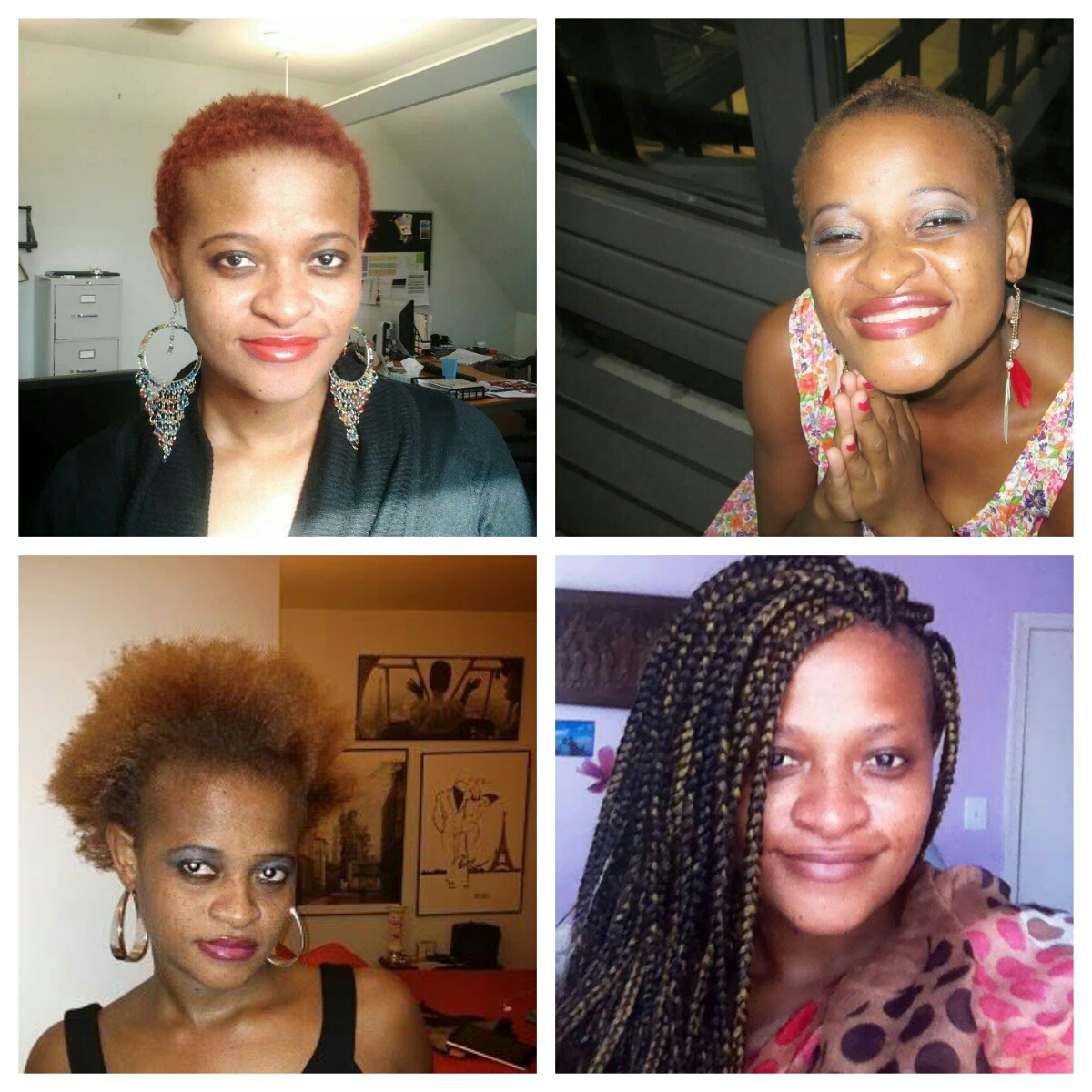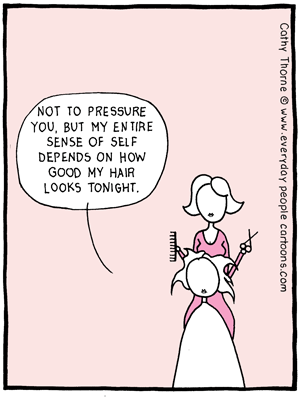



I will never forget the day I decided to cut my hair. I remember taking my walk of courage to the beauty salon seven years ago. I walked in and the lady who usually braided my hair stood in shock when I said “Cut it all off, please!” It took months of deliberation to declare this statement. It was one of the most difficult but liberating decisions I had ever made for myself. I had spent too much time trying to achieve or maintain what I have to define as, ‘beauty markers’. I had had enough!
‘Beauty markers’ are basically things women are encouraged to do in order to appear or be defined as beautiful. This encouragement is overt or covert – coming from different mediums – social media, cultural environment, other women (those aunts you avoid because they always have something to say about how to improve one or more of your body parts!) etc. I have a few examples of these ‘beauty markers’:
I once burnt my leg badly. I remember going back to school and one of the first things that one of my female teachers said to me was, “you need to be careful. No one will marry you with such a leg.”
Or the other time when a friend commented, “Well, when you have money, you can get rid of those freckles on your face.”
These are just some of the many conversations I have had throughout my life on, ‘how to be beautiful’. I internalized these comments and they began to drive my life decisions and definitions of beauty. When something is internalized, it becomes second nature and it becomes hard to differentiate between what’s normal and what isn’t; ultimately it takes critical thinking to really dissect and understand the ‘what & why’ that influences your decisions. Following the latest trend on the, “how tos” of beauty was not only expensive, but it was suffocating. The turning point for me came when I asked myself, “Who am I doing this for?”
In trying to answer that question, I realized that while my hair was (and should be) a very personal thing, it actually wasn’t. My decision making capacity was taken away from me. I felt powerless, aimlessly following whatever trend, implicit or explicit advice I got from well-intentioned people, who, by no fault of their own had internalized what they had come to believe is/should be beauty.
Today I realize that understanding POWER and the different ways in which it works and morphs itself is a critical starting point to claiming my voice in different areas of my life, including beauty. To this end, I find myself inspired to analyze and understand my “beauty” journey by using JASS’ power framework –power over, power to, power within, power for and power with. The first step in trying to understand this issue is asking, who is setting these beauty standards and why? Even though my hair is a very personal thing, why is my decision making capacity limited or absent? Who is exercising power over decisions concerning my hair or other aspects of my body?
The cultural context we live in sets the tone of how we define and express beauty. Who are the main players? How are these ideas being recycled? Why do we believe and subscribe to them? Naomi Wolf says, “Women are mere ‘beauties’ in men’s culture so that culture can be kept male.” (The Beauty Myth, 1993: 59) Understanding how the male culture constructs and prescribes certain standards and expectations, on and about women situates an issue like beauty within a bigger context and purpose. It is from this culture that different forms of control are exercised through different mediums such as magazines, tv ads, tv shows, etc.
I grew up watching a lot of American and British programs. In retrospect, it is from those shows that I got a lot of ideas about love, relationships, beauty etc. These are some of the examples in which power operates invisibly. I developed ideas of beauty that seemed and looked like my own from watching these shows. It made it easy for me to aspire and emulate these definitions of beauty, but without actively engaging in or questioning them.
 The politics of beauty have to be understood from different angles. On one end, it has become a business with “how to” prescriptions. Pick a magazine, and most of what you see are the 1,2,3 steps to achieve some kind of ‘beauty marker’. This sends the message that, while we are all not “beautiful”, we can certainly aspire to be by doing, “steps 1, 2 & 3.” It feeds into a consumer-based culture which prescribes all these products to buy regardless of environment, social or economic circumstances. We are then stuck in an endless cycle of trying to achieve these definitions of beauty that are not our own and in most cases unachievable. We begin to define our worth by these impossible standards. Cycles of self-hatred and unworthiness ensue as we either starve ourselves or follow the latest trend – all in the name of beauty! BUT FOR WHO?
The politics of beauty have to be understood from different angles. On one end, it has become a business with “how to” prescriptions. Pick a magazine, and most of what you see are the 1,2,3 steps to achieve some kind of ‘beauty marker’. This sends the message that, while we are all not “beautiful”, we can certainly aspire to be by doing, “steps 1, 2 & 3.” It feeds into a consumer-based culture which prescribes all these products to buy regardless of environment, social or economic circumstances. We are then stuck in an endless cycle of trying to achieve these definitions of beauty that are not our own and in most cases unachievable. We begin to define our worth by these impossible standards. Cycles of self-hatred and unworthiness ensue as we either starve ourselves or follow the latest trend – all in the name of beauty! BUT FOR WHO?
So, is there hope? Michel Foucault said, “Where there is power, there is resistance.” Having conversations about the invisible ways in which power operates is a starting point to begin building constructive strategies of resistance and change. My journey began by accessing the power within myself. Having the conversation about why I only braid my hair & who I do it for revealed a lot of revelations that led me to realize that I had power to change my perceptions about beauty. The act of cutting my hair was my form of RESISTANCE.
Yet, over the years, I came to realize that one of the biggest barriers I and women everywhere face was the limited definitions of beauty for/ of women–the binary either/or (s). You either cut your hair or have long hair. So, while it was liberating to step outside the limiting confines of beauty which view long hair as the epitome of beauty, I simply restricted myself to another box – the short-haired natural girl.
Situating myself within the bigger struggle for voice and decision making capacity makes me see the power with and for that I share with other women to change, hope, imagine and create alternative forms of beauty. How do we move from one hair style to another without necessarily having it define us or our worth? It all begins with having critical conversations with ourselves, our friends, family, community etc. It dismantles individualization of issues by placing and understanding them within their context. It amplifies our individual voices and narratives without isolating them from the bigger narrative of the power of male culture and how it operates.
After seven years of short hair, I recently decided to braid it and wear it long again. Was it another form of resistance? In a way, yes. I have refused to be boxed. I have chosen to be an “enlightened witness” (Hooks, 2000) in this system that I am a part of. I have chosen to have these beauty conservations with others– to laugh, get angry and appreciate them. I have chosen not to feel any less if I decide to cut my hair or grow it, wear makeup or not, dress up or dress down, etc. I have chosen to express beauty as my own, while recognizing that it is situated in a bigger context with other big players with agendas, continuously trying to define it. I have chosen to assert my power and by constantly challenging myself to do different things to my hair just because I want to, is a refreshing reminder that I am not completely powerless.
Photo Credit: Everyday People Cartoons